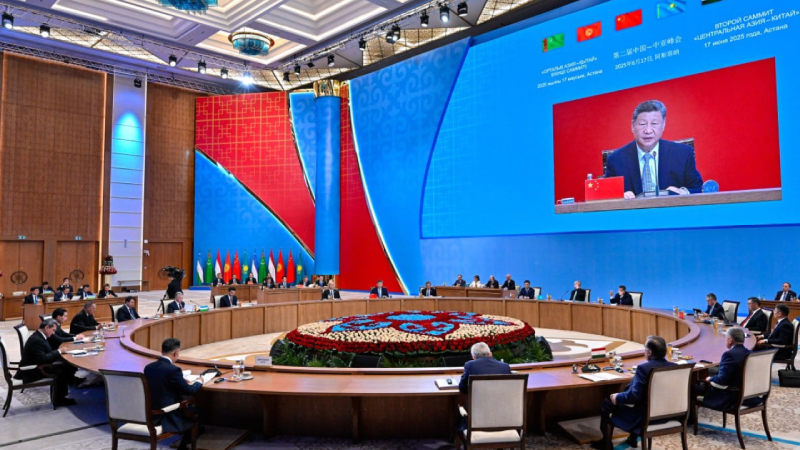Zhao Long Interviewed by South China Morning Post
Zhao Long source:South China Morning Post
source:South China Morning Post
Chinese President Xi Jinping delivers a keynote speech during the secondChina-Central Asia Summit in Astana, Kazakhstan on Tuesday. Photo: Xinhua
At a high-level summit this week, China and its Central Asian partners voiced their shared security concerns and showed a united front amid a turbulent global landscape.
The close ties between Beijing and the five Central Asian countries – whose leaders met at the China-Central Asia Summit in Kazakhstan on Tuesday – have sparked questions about whether Russia’s regional dominance is waning as it remains preoccupied with the Ukraine war.
Kremlin spokesman Dmitry Peskov dismissed this possibility on Monday, saying there was “no reason for such fears”.
“China is our privileged strategic partner, and the Central Asian countries are our natural historical partners,” he added.
But to diplomatic observers, Moscow has limited capacity to counterbalance China’s growing influence, even though Beijing is avoiding challenging Russia as Central Asia’s key security guarantor and dominant power.
Yunis Sharifli, a specialist in China-Central Asia relations at the China Global South Project, said that while China appeared to respect Russia’s lead in “hard security”, its diversified economic expansion was clearly encroaching on areas of Russian interest.
“This shift is likely causing unease in Moscow,” he said.
Zhao Long,a specialist in Russian and Central Asian affairs at the Shanghai Institutes for International StudiessaidBeijing and Moscow had distinct comparative strengths and were not engaged in exclusive competition inCentral Asia.
“'Moscow has deep-rooted cultural ties with Central Asian countries and a mature security framework, whileBeiing focuses more on economic development, However, their actions occasionally overlap in each other'sdomains," he said.
Russia remains the dominant ally in Central Asia, maintaining its influence through a formal alliance known as theCollective Security T'reaty Organisation (csTo). This bloc includes Kazakhstan, Kyrgyzstan, Tajikistan, Russia and Belarus, with Armenia having frozen its membership.
The CSTO offers collective security guarantees to its members, giving members some degree of protection underRussia's defence umbrella- a level of security that China does not provide.
Zhao noted that even if there was competition between Russia and China in the region, it was largelvcomplementary in nature)On the security cooperation front, China's security cooperation has centred on combating the three evils -terrorism, separatism and extremism - to maintain regional stability.
Zhao noted that the China-Central Asia cooperation mechanism was more focused on development.
“'Beiing and Central Asian countries already have well-established frameworks for non-traditional security underthe Shangh ai Cooperation Organisation (SC0), focusing on counterterrorism, border law enforcement, intelligencesharing, and joint exercises," he said.
Sharifli said Moscow's reliance on china amid Western sanctions and its limited economic and technologicalofferings left it little leverage to counter China's rise. He added that Beijing was unlikely to let its presence in theregion disrupt its strategic stability with Moscow.
According to Sharifli, Beijing complements Russia's hard security presence with soft security measures aimed atstabilising the region.
“ china prefers to let structural changes - such as shifts in trade patterns, energy demand, and regionaldevelopment needs - gradually reshape the balance of influence," he added.
China plays a supportive role in strengthening, Central Asia's security framework by offering training programmesand capacity-building initiatives for the region's military and law enforcement institutions.
“Under the cover of Russia's security umbrella, china can act as a 'free rider’, expanding its economic interests inthe region without bearing the financial and political costs of full-scale security commitments," sharifli said.
The 'Taliban's takeover of Afghanistan in 2021 heightened Beijing's security concerns about the country -concerns it shared with its partners in Central Asia.
“The broader engagement reflects a regional convergence on the need to contain cross-border threats and preventAfghanistan from becoming a source of regional destabilisation," Sharifli said.
China, Central Asian countries and other stakeholders have held several rounds of foreign ministers' meetingsabout the situation in Afghanistan, The fifth such summit willtake place in turkmenistan, though the exact date isnot yet known.
One major security concern has been the Wakhan Corridor, a narrow, rugged strip of land directly borderingwestern China's Xinjiang Uygur autonomous region and Tajikistan. The corridor is seen as a strategicvulnerability.
“Tajikistan stands out as the primary recipient of Chinese security cooperation. This is largely due to its long andporous border with Afghanistan - a country where China perceives a high risk of militant spillover andinstability,, Sharifli added.


